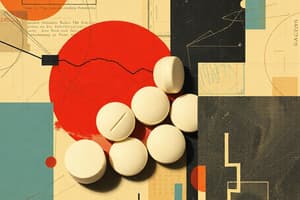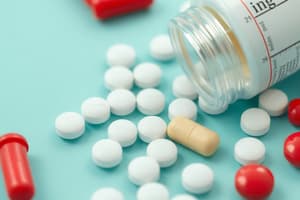Podcast
Questions and Answers
What percentage of ischemic heart disease worldwide is attributed to high blood pressure?
What percentage of ischemic heart disease worldwide is attributed to high blood pressure?
- 54%
- 26%
- 13.5%
- 47% (correct)
At what blood pressure level does the mortality risk for vascular diseases start to increase?
At what blood pressure level does the mortality risk for vascular diseases start to increase?
- 130/80 mmHg
- 140/90 mmHg
- 120/80 mmHg
- 115/75 mmHg (correct)
Which group has the highest percentage of individuals not aware of their hypertension condition?
Which group has the highest percentage of individuals not aware of their hypertension condition?
- 14%
- 30% (correct)
- 27%
- 54%
What blood pressure category does a systolic measurement of 130-139 mmHg fall into?
What blood pressure category does a systolic measurement of 130-139 mmHg fall into?
What is the maximum systolic blood pressure for a person to be classified as having elevated blood pressure?
What is the maximum systolic blood pressure for a person to be classified as having elevated blood pressure?
What percentage of individuals with hypertension receive adequate treatment?
What percentage of individuals with hypertension receive adequate treatment?
Along with medications, what approach is useful for improving patient compliance in treating hypertension?
Along with medications, what approach is useful for improving patient compliance in treating hypertension?
What is the guideline recommendation for prescribing medication in Stage 1 hypertension?
What is the guideline recommendation for prescribing medication in Stage 1 hypertension?
What is commonly referred to as 'The Silent Killer'?
What is commonly referred to as 'The Silent Killer'?
What percentage reduction in stroke risk can be achieved by lowering blood pressure by 4-6 mmHg over 3 to 5 years?
What percentage reduction in stroke risk can be achieved by lowering blood pressure by 4-6 mmHg over 3 to 5 years?
Which is NOT a risk associated with the coexistence of hypertension and type 2 diabetes mellitus?
Which is NOT a risk associated with the coexistence of hypertension and type 2 diabetes mellitus?
Which demographic most frequently experiences hypertension?
Which demographic most frequently experiences hypertension?
What is the estimated number of Americans living with hypertension?
What is the estimated number of Americans living with hypertension?
What must be a priority when hypertension and diabetes coexist?
What must be a priority when hypertension and diabetes coexist?
What is a common issue faced by patients undergoing antihypertensive therapy?
What is a common issue faced by patients undergoing antihypertensive therapy?
What effect can antihypertensive drugs have on asymptomatic patients?
What effect can antihypertensive drugs have on asymptomatic patients?
What is the primary nature of hypertension (HT)?
What is the primary nature of hypertension (HT)?
What can often happen if hypertension remains untreated?
What can often happen if hypertension remains untreated?
Which of the following is considered an essential part of hypertension management?
Which of the following is considered an essential part of hypertension management?
How does hypertension affect the arteries over time?
How does hypertension affect the arteries over time?
What condition is associated with atherosclerosis of the coronary arteries?
What condition is associated with atherosclerosis of the coronary arteries?
What is a potential consequence of chronic cardiac ischemia?
What is a potential consequence of chronic cardiac ischemia?
Which of the following lifestyle changes can help control hypertension?
Which of the following lifestyle changes can help control hypertension?
What effect does high blood pressure have on renal arteries?
What effect does high blood pressure have on renal arteries?
Flashcards are hidden until you start studying
Study Notes
Overview of Hypertension
- Hypertension (HT) is primarily a chronic disease, often asymptomatic, especially in stage I and II.
- End-organ damage occurs late in the disease progression, affecting blood vessels, heart, and kidneys.
- Long-term treatment with blood pressure-lowering medications is typically essential.
- Lifestyle changes, including exercise, healthy diet, low salt intake, and stress reduction, are critical initial treatments and can sometimes negate the need for medications.
Consequences of Untreated Hypertension
- High BP damages blood vessels, leading to serious complications:
- Atherosclerosis accelerates, resulting in cerebral artery issues (transient ischemic attacks, strokes) and coronary artery diseases (angina, acute coronary syndromes).
- Chronic cardiac ischemia can cause heart failure.
- Renal artery atherosclerosis can lead to chronic kidney disease, necessitating dialysis or transplants.
- High blood pressure contributes to global health crises:
- 13.5% of premature deaths, 54% of strokes, and 47% of ischemic heart disease deaths worldwide are linked to high BP.
Treatment Gaps
- Almost 30% of individuals with hypertension are unaware of their condition.
- 14% of those diagnosed remain untreated, while 27% receive inadequate treatment.
- Only 26% achieve adequate treatment levels.
- Essential hypertension has an unknown cause but is costly both for patients and healthcare systems.
Blood Pressure Classification
- New guidelines categorize blood pressure as follows:
- Normal: <120/80 mmHg
- Elevated: 120-129 systolic and <80 diastolic
- Stage 1: 130-139 systolic or 80-89 diastolic
- Stage 2: ≥140 systolic or ≥90 diastolic
- Medication is advised for Stage I hypertension if there's a history of cardiovascular events or significant risk factors.
Comorbidity with Diabetes
- Over 11 million Americans have both hypertension and type 2 diabetes.
- Hypertension not only increases prevalence in diabetic patients but also elevates cardiovascular risks.
- Effective blood pressure management is crucial to slow vascular and cardiac lesion development and reduce morbidity and mortality.
Medication Compliance and Education
- Essential hypertension—dubbed "The Silent Killer"—is often asymptomatic, which can lead to poor compliance with antihypertensive therapies.
- Side effects of medications may deter treatment adherence.
- Patient education on the disease’s natural progression and effects is vital to improve compliance and encourage lifestyle changes.
Epidemiology and Impact
- Hypertension is the most prevalent cardiovascular condition, affecting approximately 50–60 million people in the U.S. and one billion globally.
- A reduction of 4-6 mmHg in BP over 3-5 years can significantly lower stroke risk by 42%, myocardial infarction risk by 16%, and total vascular mortality by 21%.
- Effective management of hypertension is essential to mitigate risks of strokes, heart attacks, and kidney disease.
Studying That Suits You
Use AI to generate personalized quizzes and flashcards to suit your learning preferences.




